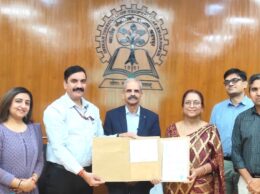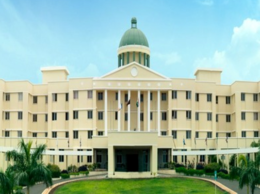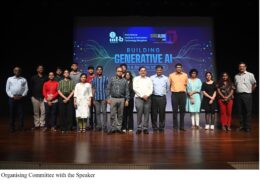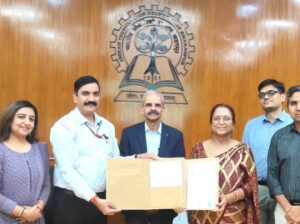New Delhi – Maharaja Agrasen Business School, a premium B-School in the country conducted its first employability seminar. The theme for the seminar was – “Emptalks Live- How to get workplace ready?” The seminar brought top professionals on a single platform that deliberate insightful sessions on various aspects of the employability. The mega seminar saw active participation of 800+ students. Bridging the gap between industry and academia, this conclave gave students an opportunity to gain industry insights from renowned industry dignitaries and their views on the current trends.
The event was divided into two sessions. Session 1 focused and deliberated on ‘Building the global talent in India’. The panelists for this session were- Dr. Nand Kishore Garg, Founder Chairman & Chief Adviser at MATES, Prof. Duncan Bentley, Vice-Chancellor and President of Federation University, Australia, Dr. Manish Malhotra, Chairman & CEO of Employability.life, UK.
Whereas, Session 2 was focused on discussing ‘How does experience in education play a role in Improving Graduate Employability?’ The panelists for this session were- Ms. Carolyn Chong, Deputy Vice-Chancellor (Global and Engagement) at Federation University, Australia, Dr. Sanjiv Marwah, Director, MABS, Mr. Vinit Sinha, Director of Cybersecurity at Mastercard, Pro Vice-Chancellor at Chandigarh University and Mr. Supriyo Chaudhari, President of Employability.life. Both the sessions were moderated by Ms. Neha Khanna, Executive Producer and senior anchor, WION.
Addressing the seminar, Dr. Nand Kishore Garg, Founder Chairman & Chief Adviser at MATES, said, “It is very important to take a broader look at the international aspects of talent development, and the implications for nurturing the most productive graduates in India. He emphasized that building optimal designs for the future educational institutions, including the co-operative model, and ways to ensure that students get opportunities to improve their employability. He said that in 1972, when he had completed his graduation, he never thought that life would change so much in the next 50 years. He explained the he had witnessed vast and impressive innovations in technology and social changes with changing times. With that he contrasted the need of India and Australia and said that in India, we need to be more self-reliant and in order to make that happen we need employability, start-up eco system and futuristic technology. He spoke about brain drain and mentioned initiatives taken by present Govt to make programmes industry relevant in the new education policy. He also emphasized the importance of global skills while developing good human values as the centre stage for learning systems.”
Professor Duncan Bentley, Vice-Chancellor of Federation University Australia, said, “In a first for Australia, the globally recognised co-operative education model will be embedded across all Federation programs from 2025. We have a longstanding relationship with India and we look forward to playing our part in realizing its vision to be the ‘skills capital’ of the world.” He Further added, “This collaboration will provide an opportunity for eligible students to visit and work on projects within the IBM emerging technologies hub and in Australia’s largest university technology park located at Federation’s campus in Ballarat, Victoria.”
Dr. Manish Malhotra of Employability.life, said, “India’s dream of building a $5 Trillion economy rests on ensuring that its youth engages productively and meaningfully. Employability.life, working in partnership with the country’s most forward-thinking education institutions and its global network of entrepreneurs, educators and employers, wants to empower the students to lead their country towards that goal.”
Mr. Vinit Sinha, Director at MasterCard, said, “Industry looks for collaborative team players. It is not you, it is us.” What you are being taught today will stay with you as fundamentals. But, over the next 10-15 years, you will have to continuously upgrade yourself. He explained that students are taught fundamentals today but as the time changes new fundamentals and skills are required ,but that does not mean that we should underestimate the importance of fundaments as stronger the roots stronger the tree. He also advised students on key skills to be developed for better employability.”
Prof. (Dr.) Sanjiv Marwah, Director of Maharaja Agrasen Business School, said, “Industry and academia have a lead follow cycle. The industry and academia need to change their relation, no more donor-taker relation, it could be collaborative.” With recent pandemic years, the skills are becoming obsolete quickly.” He further added, “India and academics have different roles to play, but collaborative role can help live projects by academic connect students with the industry. He explained that industry and academia need to come together and work as a whole in order to provide experience and practical knowledge to students as even though both, education and industry have a different role to play, it is very important for a student to work and receive the actual experience that only textbooks cannot provide. He spoke on reducing half-life of skills due to technological advancements and mentioned that the Maharaja Agrasen Business school provides various add on courses for skill enhancements and provides career counseling for better employability”
Ms. Carolyn Chong, Pro- VC Federation University said, “As the time changed, we witnessed evolutions and underlying issues brought up to the surface. Several issues which were neglected earlier are discussed and prioritized now. We hear people talking about climate change, environment and sustainability. India is developing and advancing impressively.”
All the other speakers focused on new-age partnerships to improve the employability skills of Indian students to get ready for global employability challenges and prepare for the same parallel with their academics in college.









